Salvador – Arab and African ambassadors that are on an official mission to Bahia took part, this Wednesday (20), of a seminar organized by the Federation of Industries of the State of Bahia (FIEB), which gathered officials from the public sector and representatives of Bahia’s private sector. The event took place at the Manufacture and Technology Integrated Campus (CIMATEC) of the National Service of Industrial Training (SENAI), which combines professional training, university center and a research lab with a focus on the industry sector.
Given the place’s purpose, cooperation in the areas of professional training, sharing of experiences and transfer of technology were some of the main topics discussed. The president of the Arab Brazilian Chamber of Commerce, Rubens Hannun, who is taking part in the delegation, suggested, for instance, a partnership between the Arab Chamber and the Brazilian Micro and Small Business Support Service branch in Bahia (SEBRAE-BA) to train the state’s small companies on how to negotiate with Arab companies.
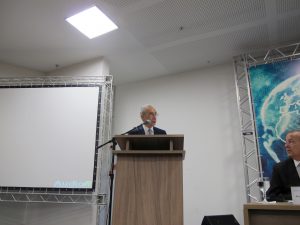
“We can train the small and medium-size companies so that they are prepared for internationalization, one focusing on the Arab countries,” said Hannun. “The Arab Chamber can provide this training,” he ensured.
In response, the superintendent of SEBRAE-BA, Jorge Khoury, said that the organization that he leads shares the same understanding. “How can we interact so the companies can have the knowledge on how to negotiate with Arab and African countries?”, he asked. “I feel even more committed [with this initiative], since my family came from the Arab world,” declared Khoury, who has a last name of Syrian-Lebanese descent.
Some information on negotiations with Arab were given to the entrepreneurs in attendance by the Arab Chamber’s CEO, Michel Alaby, who spoke on the countries of the region and their trade relations with Brazil and Bahia. “Each Arab country is a different country, but all of them present trade and investments opportunities,” he said. He mentioned, for instance, that the Arab world has around 60% of the world’s oil reserves, but that not all of the nations in the region have an abundance of oil.
Still in the cooperation in training and technology subject, the manager of Technology and Innovation of SENAI CIMATEC, Daniel Motta, pointed out that the organization has an interest in taking its knowledge to other countries via partnerships focusing on academic collaboration, transfer of technologies, support to governments and Brazilian companies operating abroad. CIMATED already has sharing initiatives with African countries, said Motta.
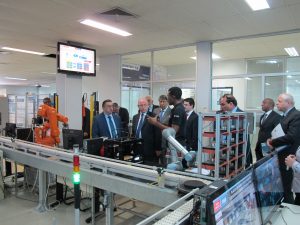
The ambassadors visited the model plant set up inside CIMATEC, where professionals are trained as if they were, in fact, inside a real plant, operating high-technology machinery and using modern management methods. The plant was developed in a partnership with the management consulting firm McKinsey & Company, and the SENAI staff involved with the project travelled to Morocco to get to know a similar model that was set up in Casablanca.
Hannun also suggested an exchange program in renewable energies. Bahia has a strong sector of wind and solar power, and he asked entrepreneurs from the state and from this sector to take part in the Gitex Technology Week, the trade expo scheduled for October, in Dubai, where the Arab Chamber will have a 50-square-meter stand.
Business
The investment opportunities in Bahia were also a highlight of the event. The state’s vice governor, João Leão, said, for instance, that in November there will be a bidding round for the construction of a bridge crossing the entrance of Baía de Todos os Santos (All Saints Bay), connecting Salvador to Ilha the Itaparica (Itaparica Island), which will drastically reduce the road trips from Salvador metro area to the south portion of the state. “This bidding round will be open to corporations from all over the world,” he remarked.
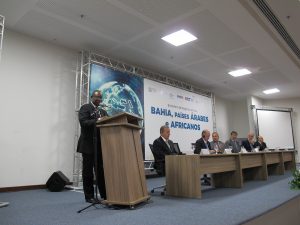
He and the chief of staff, Bruno Dauster, and the secretary of Tourism, José Alves, also mentioned other road, railway, port and airport projects and opportunities in the agribusiness, mining, renewable energy and hotel sectors and other tourist services.
On the other hand, the dean of the Council of African Ambassadors, Martin Mbeng, pointed out that Africa is open to investments. “There are 54 countries, we have diversified economies, where the small and medium-size companies play a special role,” he said, ensuring that the size of a company doesn’t matter when doing investments in the continent. “In our continent, there’s a wide range of opportunities. We are not inviting you [to go to Africa] for sentimental reasons, because you are our cousins from the other side of the ‘pond’, but to do business, because they are profitable,” added Mbeng, who is Cameroon’s ambassador in Brazil.
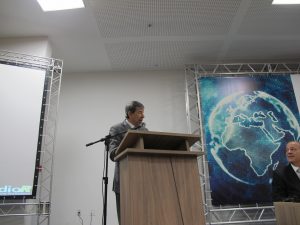
In the same line, the dean of the Council of Arab Ambassadors in Brazil, Ibrahim Alzeben, said that the trip to Bahia serves “to remind us of our roots”, given the Arab and African presence in the state, but also to present the existing opportunities in both regions. “And they are no small thing, as you see in the media sometimes. We have a lot to offer, not only cheap labor, not only oil,” he remarked. “We have business opportunities and we wish to encourage a different perspective on the Arab world and Africa, who are your [people from Bahia] partners and have a shared history,” said Alzeben, who is Palestine’s ambassador in Brazil.
Some of this shared history the ambassadors were able to find at the Bahia Public Archive, where the staff selected to the diplomats documents dated from the 18th century that show the Arab and African presence in the state, including letters with prayers written in Arabic from the time of Revolta dos Malês, an uprising by African slaves that occurred in 1835.
Assessment
Rubens Hannun deemed the mission a positive one. In the previous day, he had suggested the creation of a workgroup to explore business and cooperation opportunities between Bahia and the Arab countries. “The idea was very well received. They were very welcoming, both sides,” he told ANBA.
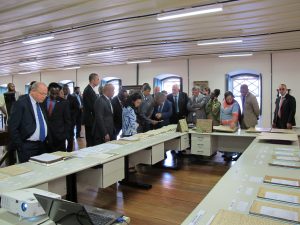
For the executive, there are many business opportunities. He mentioned, for instance, the areas of infrastructure, renewable energy, food products and tourism. “We will work closer and give continuity,” he said. Hannun argues that relations must be ongoing, of long-term and must go beyond business to be sustainable. Sharing in the cultural, social and other areas must be encouraged. “There are many opportunities and the doors are being opened. The Chamber, the Council of Ambassadors and the government of the state of Bahia will keep the group going,” he concluded.
In the same line, FIEB’s president, Antônio Ricardo Alban, said: “We need to promote an actual integration, only this ensures something really promising.”
Michel Alaby also assessed the trip as positive. “We had the FIEB event and the possibility of agreements with SENAI CIMATED. Many ambassadors will resume contact to sign possible agreements, which is the result of the Arab Chamber’s work,” he said.
Alaby said to be particularly impressed with the production numbers of soy, maize and cattle in Bahia, and he also talked to business owners from the textile, construction and food products sectors that were interested in doing business with the Arabs. “I’m sure the ambassadors will return to Bahia to check on compelling business possibilities, being in the area of investments or in the tourism area,” he added.
Translated by Sérgio Kakitani




